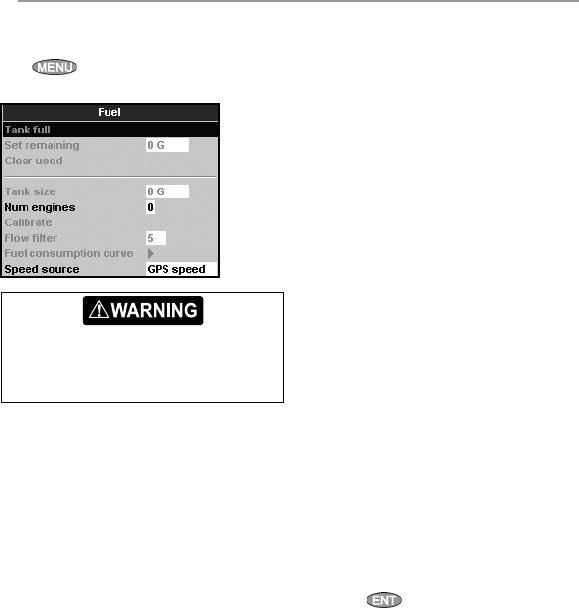
Northstar Explorer 538i/538 Installation and Operation Manual
44
Fuel setup requires optional petrol/gasoline
or SmartCraft sensors to be installed. Set
Num
engines first to enable the fuel functions.
Press
one or more times until the Setup
menu is displayed, then select Fuel:
Tank full
Tells the Explorer 538/538i you have filled a fuel
tank (see section 10-1).
Set remaining
Tells the Explorer 538/538i you have added or
removed fuel (see section 10-1).
Clear Used
Select
Clear used to set Used (the amount
of fuel used) to zero. Do this to start measuring
the amount of fuel used over a certain time or
distance.
Tank size
Enter the capacity of the fuel tank. Northstar
recommends measuring tank size by draining
the fuel tank, filling it to capacity and using the
fuel dispenser’s reading. Beware of air pockets,
especially in underfloor tanks.
Num. engines
Set the number of engines to
0, 1 or 2. If 0 is
selected the fuel features are turned off.
14-4 Setup > Fuel
Calibrate
SmartCraft fuel sensors are factory calibrated
and should never need recalibrating. Calibrating
Northstar petrol/gasoline sensors gives more
accurate fuel values.
Twin engine installations require each fuel
transducer to be calibrated. This can be done
at the same time with two portable tanks or at
different times using one portable tank.
Calibrating the fuel transducer(s) requires
accurate measurement of the fuel consumption.
This is best done using a small portable tank. At
least 4 gallons (15 litres) of fuel should be used to
ensure an accurate calibration.
It is often very difficult to fill underfloor tanks to
the same level twice due to air pockets, so the
more fuel used, the more accurate the calibration.
To calibrate the fuel transducer(s), perform the
following steps:
1. Record the level of the fuel in the tank(s).
2. Connect the portable tank(s) to the engine
through the fuel transducer(s).
3. Run the engine at normal cruising speed until
at least 4 gallons (15 litres) of fuel has been
used per engine.
4. Check the actual amount of fuel used per
engine by refilling the portable tank(s) to the
original level and noting the reading(s) from
the fuel dispenser’s gauge.
5. Select
Fuel. Use the cursor keys to change
the reading for each engine to match that on
the fuel dispenser’s gauge.
6. Press
when the reading is correct.
Note: If the fuel calibration options appear to
give erroneous readings after a while, first check
that the fuel sensor has been installed correctly
according to the installation instructions supplied
with it, then see Appendix B - Troubleshooting.
Flow filter
Most engines do not draw fuel from the tank at
a steady rate. To give a stable fuel flow reading,
the Explorer calculates the flow value(s) by taking
several measurements and averaging them. Use
the Flow filter to set the period over which the
fuel flow is averaged.
Fuel consumption can change drastically
depending upon the boat loading and the sea
conditions. Always carry adequate fuel for the
journey, plus a reserve.


















